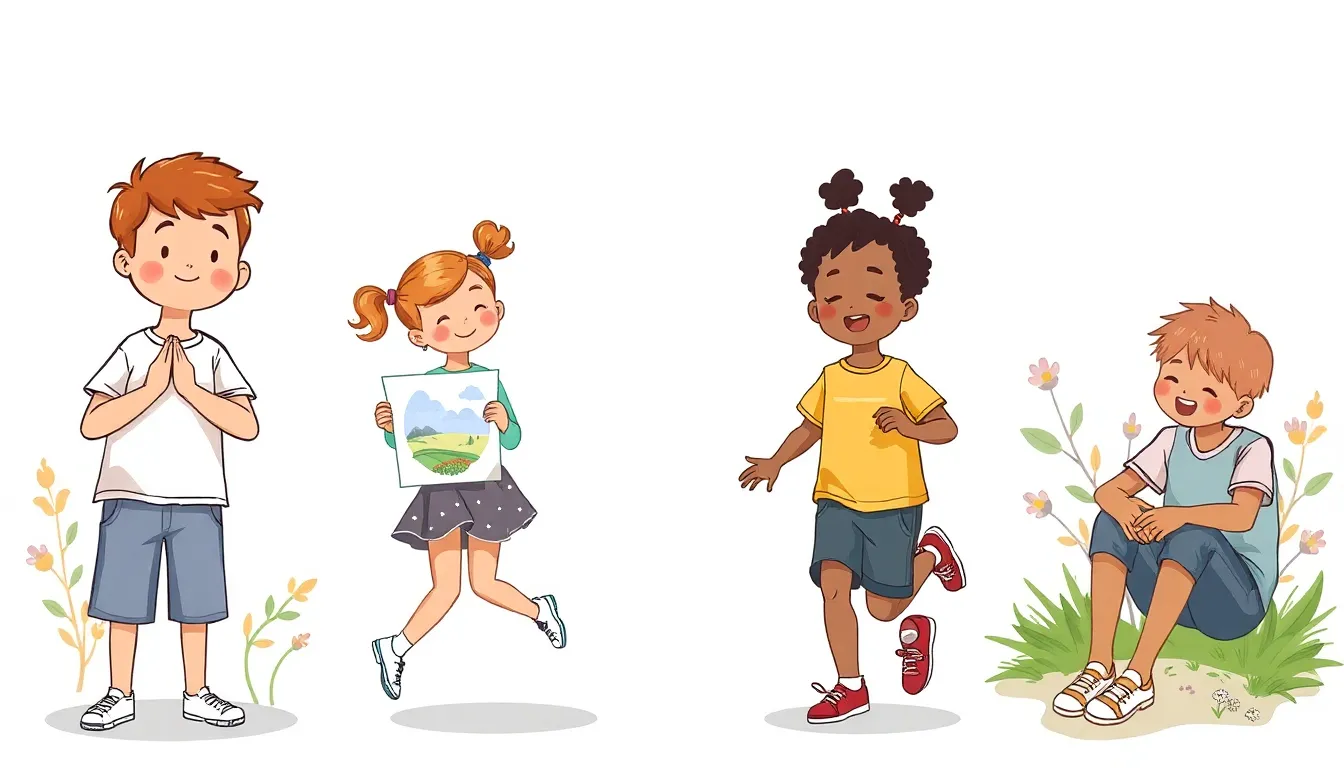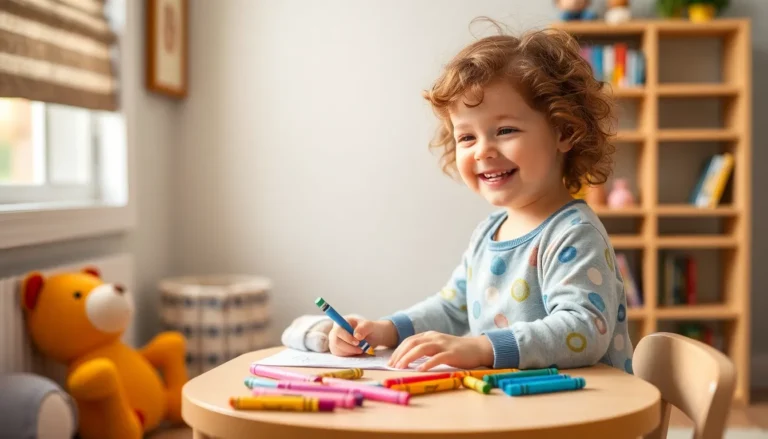Table of Contents
ToggleNavigating childhood can feel like an obstacle course filled with emotional landmines. From the dreaded school lunch drama to the perplexing world of friendships, kids face challenges that would make even the toughest adults break a sweat. That’s where coping skills come in, acting like a superhero cape for young minds.
Teaching children how to manage their feelings isn’t just a nice idea—it’s essential for their emotional toolkit. With the right coping strategies, kids can transform tantrums into triumphs and stress into success. So let’s dive into the world of coping skills for children, where laughter meets resilience and every little challenge becomes a stepping stone to growth. After all, who wouldn’t want to raise a mini emotional ninja?
Understanding Coping Skills for Children
Coping skills help children handle stress and manage their emotions. These skills empower kids to navigate challenges with confidence and resilience.
Definition of Coping Skills
Coping skills refer to the strategies individuals use to deal with difficult emotions or situations. They include techniques such as deep breathing, positive self-talk, and problem-solving approaches. Children can learn to recognize their feelings and apply these skills effectively. Constructive coping skills enable children to transform negative experiences into manageable situations. For instance, engaging in hobbies or talking to a trusted adult can serve as effective coping mechanisms.
Importance of Coping Skills in Childhood
Coping skills play a vital role in emotional development during childhood. Effective coping strategies contribute to better emotional regulation, leading to improved mental health outcomes. Children equipped with coping skills can handle peer pressures and academic demands more successfully. These skills also foster resilience, allowing kids to bounce back from setbacks. Research indicates that children with strong coping skills demonstrate higher levels of self-esteem and fewer behavioral problems. Teaching these skills early promotes long-term wellness and emotional intelligence.
Types of Coping Skills

Coping skills fall into two main categories: emotion-focused strategies and problem-focused strategies. Both types enable children to manage their emotional experiences effectively.
Emotion-Focused Strategies
Emotion-focused strategies help children manage feelings directly. Techniques like deep breathing assist kids in calming anxiety or fear. Visualization encourages children to imagine peaceful scenes, which can alleviate stress. Positive self-talk builds self-esteem by counteracting negative thoughts. Engaging in physical activities, such as running or dancing, allows kids to release pent-up emotions and improve mood. Mindfulness practices teach children to stay present, reducing overwhelming feelings. Each approach offers tools for emotional regulation, fostering resilience.
Problem-Focused Strategies
Problem-focused strategies empower children to tackle challenges head-on. Identifying the problem is the first step in this proactive approach. Taking manageable steps toward solutions helps kids gain confidence. Creating pros and cons lists allows children to weigh options effectively. Seeking help from trusted adults or peers encourages collaboration and reduces feelings of isolation. Time management skills ensure children balance academic demands and personal interests effectively. Each strategy contributes to developing critical thinking and resilience, equipping them to face difficulties with confidence.
Teaching Coping Skills to Children
Teaching coping skills equips children with essential tools to handle emotional challenges. These strategies increase resilience and emotional intelligence.
Age-Appropriate Techniques
Children at different developmental stages require tailored coping techniques. Preschoolers benefit from simple methods like deep breathing and visualizations. Elementary school children find value in journaling, engaging in physical activities, and practicing positive self-talk. Middle schoolers gain skills through structured problem-solving, time management, and seeking assistance when facing obstacles. Each of these age-specific strategies enhances their ability to cope with stress effectively.
Role of Parents and Educators
Parents and educators play crucial roles in teaching coping skills. They model effective strategies during daily interactions. Encouragement from adults helps children practice these techniques in real-life situations. Open communication fosters a safe environment, allowing children to express feelings without judgment. Regular check-ins can identify emotional challenges, enabling proactive support. Collaborative efforts reinforce coping strategies, ensuring children develop resilience and emotional intelligence for future challenges.
Benefits of Developing Coping Skills
Developing coping skills benefits children in several critical areas. These skills play a significant role in emotional development and overall well-being.
Improved Emotional Regulation
Coping skills enhance emotional regulation. Children learn to recognize and express feelings effectively, leading to healthier responses during stressful situations. Techniques such as deep breathing and mindfulness practice equip children to manage anxiety and frustration. Greater emotional regulation fosters resilience, creating a foundation for long-term mental health. Positive self-talk serves as a powerful tool, enabling children to challenge negative thoughts and beliefs. When they can process emotions constructively, children experience fewer outbursts and conflicts. This development contributes to improved relationships with peers and adults, promoting social skills alongside emotional growth.
Enhanced Problem-Solving Abilities
Problem-solving abilities improve through the development of coping skills. As children learn to identify challenges, they become adept at evaluating solutions. Structured approaches such as creating pros and cons lists or brainstorming options foster critical thinking. Children gain confidence as they tackle academic tasks and social dynamics. With effective strategies in place, they become more proactive in addressing difficulties instead of feeling overwhelmed. Seeking help becomes a natural response, allowing them to navigate problems collaboratively. Overall, enhanced problem-solving abilities contribute significantly to children’s independence and success in various aspects of their lives.
Challenges in Teaching Coping Skills
Teaching coping skills presents several challenges. Misunderstanding these skills can hinder their effective implementation.
Common Misconceptions
Many believe coping skills only involve distraction techniques. This misconception overlooks the importance of emotional awareness and regulation in building resilience. Some think teaching coping skills becomes unnecessary once initial emotional distress subsides. In reality, continuous reinforcement fosters deeper understanding and application. Others may assume all children inherently know how to cope, ignoring individual differences in emotional intelligence and experiences. Recognizing these misconceptions enhances teaching strategies and supports children’s developmental needs.
Barriers to Implementation
Implementation barriers often arise from a lack of resources. Schools and parents might not have access to proper training or materials for teaching effective coping strategies. Time constraints also pose significant challenges in integrating these lessons into busy schedules. Furthermore, reluctance from parents or educators to prioritize emotional training can impede progress. Children may struggle if adults model ineffective coping strategies themselves. Acknowledging these barriers helps create more effective pathways for teaching and reinforcing coping skills in everyday settings.
Teaching coping skills to children is essential for their emotional development and overall well-being. By providing them with effective strategies to manage their feelings and tackle challenges, parents and educators can foster resilience and confidence. These skills not only help children navigate everyday obstacles but also lay a strong foundation for their future emotional intelligence.
As children learn to express their emotions and solve problems, they become better equipped to handle stress and peer pressures. It’s crucial to recognize the importance of age-appropriate techniques and create supportive environments that encourage practice. Ultimately, investing in coping skills today will empower children to thrive in various aspects of their lives tomorrow.







